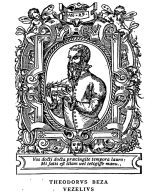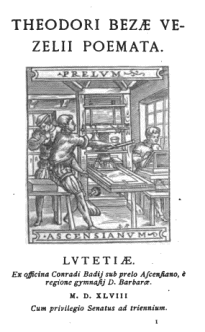 |

|
||
|
|
Théodore de Bèze, de Vézelay en Bourgogne (1519-1605)Beza's family originated from 'Bèze' (Burgundy). He himself lived in Vézelay for a while (you can still see his house there). The young Théodore got Melchior Wolmar as a tutor and studied law at the university of Orléans. Before his conversion to calvinism he was one of the rising stars in the world of neolatinists (1544-1548). In his first poetic publication (around the age of 30, of course, adolescentia) he joins the club of sophisticated Marot-adorators. Like Bourbon, Macrin and others before him, he wrote an epigram in praise of Marot’s poetic craftmanship. Calvin asked him to complete the work of Marot in Geneva, a task he reluctantly accepted (still 100 Psalms to translate, quite a job). In 1551 thirty-four appeared, a little later another six (to be sung on the tune of another psalm). In 1561 he prepared the entire Psalter for publication, got a privilege to publish in France, creating the bookworld-event of 1562: The complete Psalter of David, versified by Marot and Bèze. Others had done it before in France (completing Marot's Psalter), but none with a success in any way comparable to this Psalter. Bèze admired Marot and paid tribute to him both in his neo-Latin poetry (1548) and in the liminary poem of his first Psalm-publication (1551). Below one poem from his Iuvenilia about Marot, his epigram in reply to Guillaume Gueroult, and Ronsard's reference to Beza. [for readers, who understand Dutch: The same can be read, plus more about his Iuvenilia and the Psalms] Iuvenilia, 1548: Ad Cl. Marotum
It refers to Marot’s rondeau Au temps passé, Apelles, Painctre sage...
This is the real 'original', popular in the 16th century, because often included in anthologies:
Paris saw me naked, as did Anchises, Adonis too: I know only of these three. So how did Praxiteles... ? For more background, see: Andrew W. Taylor, "Between Surrey and Marot: Nicolas Bourbon and the Artful Translation of the Epigram", Translation and Literature 15.1 (2006) 1-20
Converting to (or at least moving towards) protestantism, De Bèze started to write poetry in French (a play: Abraham sacrifiant, partly a medieval mystery play and partly a Greek tragedy) and began – in the liminary text – a debate about the real object (subject?) of poetry, attacking the frivolous poetry of the emerging Pléiade (not of course: because he did not like it, but because he was attracted to it: if he had stayed in France he might have become one of them). He tried to convince his colleagues that the better French poetry was a sober French poetry, confining the ‘learnedness and allegories’ to the Latin poems among friends. He saw in Marot’s translations (of Ovid and of course mainly the Psalter) an example of what he meant and he tried to continue in that line, also providing it with the necessary ‘scientific’ (literary-philosophical) basis, even with a vision on orthography (He propagated a modern orthography, fashionable in Geneva (Jean Girard) - like Marot, if we link the orthographical tract published together with Marguerite's Le Miroir and Marot's French prayers & Psalm 6 to Marot - but rejected Meigret’s. De Bèze wrote some very nice lines about Marot as a poet (less sympathetic when his morals are concerned, see below Icones). He really must have admired his poetic skills The most humorous reference to Marot is his reply when he himself was under attack on behalf of his Psalm poems by Guillaume Guéroult. This poet had published Psalm versifications as well and - in collaboration with his uncle Guillaume Du Bosc - he intended to publish some more of his own together with Marot’s, a project frustrated by the City Council, advised by Calvin and De Bèze. Guéroult wrote malignantly:
Nicely put but a fatal underestimation of the polemic (poetic) power of Théodore de Bèze:
The Pléiade and Bèze. Ronsard had expressed some feelings of ‘rapprochement’ towards the cause/case of the Reformed in the period just before the outbreak of the first civil war (1560-63). In 1559 he even publicly regretted that De Bèze had been evicted ('délogé) only ‘pour une opinion’.
This Louis des Masures was also a friend of Bèze. In 1550 Théodore (then in Lausanne) had suggested to Calvin to split the immense job of translating the 101 remaining Psalms between him and De Masures. Calvin rejected. He did not trust the loyalty of Des Masures to the cause of the Reformation; of Bèze he was sure. It remains telling however, that the Vingt Pseaulmes, published by Des Masures in 1557 in Lyon, only contains one 'double' with Bèze's Psalms (= Ps. 16, the first non-Marot Psalm. He did Pss. 1-15). However, a rupture between Bèze and the poets of the Pléiade became inevitable as the religious opposition hardened. The friendly ‘discussion’, or the ‘debate’ on content ('pour une opinion') escalated in the 1560s. Pléiade and protestant poets engaged in an guerre de plume, a war of pamphlets. Things got extreme: It was either-or. At the time of the first military activity Ronsard published his Discours à la royne (“Discours des miseres de ce temps à la Royne mere du Roy”) harshly attacking the protestants. When poets attack him, he is full of dédain, because they are minor poets, rimeurs, with only one exception: Théodore de Bèze: The former ‘companion’ is the only protestant poet to be taken seriously. In the Continuation des miseres he even adresses Bèze quite friendly, trying to 're-convert' him to real French Poetry. Geisendorf writes in his biography that Ronsard respects Bèze “parce que ce gentilhomme vendômois a trouvé dans ce gentilhomme nivernais un adversaire à sa taille” (p. 230). – although I am not sure if there is not more irony in the eloge of 'the great soldier (from) Bèze' than is generally understood. For inventory: the 'Villemadon Letter' (ca. 1560) is quite clear in the rejection of Ronsard c.s. by the Protestants. [Bèze kept silent. Only the pastor-poets Chandieu and Montméja reacted with pamphlets]
|
||
